LinkedIn alternatives
Updated: July 30, 2023
LinkedIn alternatives are professional networking platforms that offer an alternative to the popular LinkedIn platform. These alternatives cater to individuals and businesses seeking to connect with other professionals, share expertise, and explore career opportunities in a different setting. While some LinkedIn alternatives focus on specific industries or professions, others may prioritize privacy and data protection. These platforms offer features similar to LinkedIn, such as creating profiles, connecting with other users, joining groups, and accessing job listings. Some LinkedIn alternatives may also emphasize more casual and personal interactions, promoting a relaxed and friendly networking environment. By providing diverse options for professional networking, LinkedIn alternatives give users the freedom to choose a platform that aligns best with their preferences and goals, fostering a dynamic and inclusive online professional community.
See also: Top 10 Social Media Management tools
See also: Top 10 Social Media Management tools
2020. Cooper raises $2M to build a professional network centered on introductions
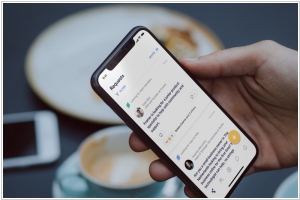
Cooper, an innovative platform focused on facilitating introductions, has successfully raised $2 million in seed funding. Unlike existing professional networking sites that primarily serve as directories of online résumés and emphasize the quantity of connections, Cooper takes a different approach. It aims to create a private professional network where the emphasis is not on the number of connections but on bringing together trusted individuals within a circle. Cooper achieves this by limiting users' connections to people they genuinely know. The platform utilizes a user's online calendar data and provides them with a personalized invite code that can be shared with their professional contacts, ensuring a curated and trusted network.
2019. Google ramped up competition with Facebook and LinkedIn with new tools for local businesses
Google continues its competition with Facebook and LinkedIn through its suite of tools called Google My Business. The recent update brings several additional features to enhance business profiles and make them more appealing. One of these features is the ability for businesses to include their logo in their profile, along with the option to upload photos that will be displayed in a dynamic module on the profile (soon to include captions), as well as set a profile cover photo. These additions aim to rival the capabilities of Facebook Pages. Another new feature allows businesses to claim a short name and URL for their profile, enabling easier navigation for users directly to their profile page. In the coming months, customers will also be able to search Google Maps using these short names. Additionally, a new feature called "welcome offers" has been introduced, enabling businesses to reward new customers for following them by offering discounts or special deals.
2019. German LinkedIn rival Xing is rebranding as New Work
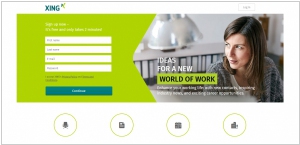
Xing, often referred to as Germany's equivalent of LinkedIn, has taken steps to enhance its recruitment services and prepare for a rebranding of the company under the name "New Work." As part of this strategic move, the platform has acquired Honeypot, a German startup that has developed a job-hunting platform specifically tailored for tech professionals. The acquisition, valued at up to €57 million ($64 million), represents Xing's largest acquisition to date. Xing has expressed its intention to integrate Honeypot and other acquired assets into the New Work brand, which is scheduled to be unveiled in the second half of 2019. These developments aim to consolidate and strengthen Xing's position in the business networking and recruitment sector.
2018. Facebook takes on LinkedIn with Job Posts
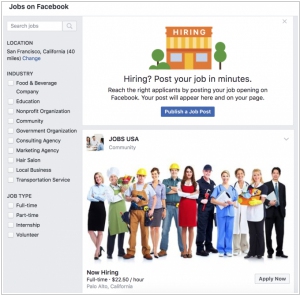
Facebook is expanding the availability of job posts to 40 additional countries, following their initial launch in the U.S. and Canada last year. This feature allows businesses to post job openings on various platforms including a Jobs tab on their Facebook Page, Jobs dashboard, Facebook Marketplace, and the News Feed. These job posts can be further promoted through ads. On the other hand, job seekers will have the opportunity to explore job opportunities, automatically fill out applications using their Facebook profile information, make edits, submit applications, and even communicate via Messenger to schedule interviews. It is worth noting that Facebook's focus is primarily on assisting low-skilled job seekers, distinguishing itself from platforms like LinkedIn. This update also introduces new sections that allow users to discover jobs based on filters such as proximity, industry, and preferred job type (full-time or part-time).
2015. Facebook At Work is not a LinkedIn killer

When Facebook announced the development of an enterprise product called Facebook at Work last year, many anticipated it would rival LinkedIn. However, it has become evident that it will join the crowded space of internal social networks in the enterprise sector. As the product enters its testing phase, Facebook will directly compete with established platforms like Microsoft's Yammer, Chatter, Slack, Convo, Socialcast, and others. Facebook at Work will resemble the functionality of current features such as Groups and public profiles. The platform will maintain the familiar look and feel of Facebook, including the News Feed, groups, messaging, and events. Employers can create dedicated log-ins for employees to access their Work accounts, or users can integrate their existing profiles to consolidate all activities in one place. The Facebook at Work app is currently available for download on iOS devices, with an Android version expected to follow soon.
2014. Business social network BranchOut is sold out
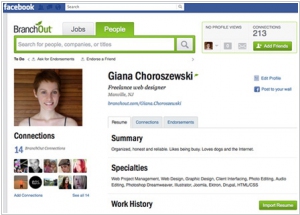
1-Page, an HR software company, has acquired BranchOut, the startup that aimed to establish a "LinkedIn within Facebook," for approximately $5.4 million. Initially, BranchOut gained rapid popularity by providing a Facebook app that allowed users to utilize their social network's contact list as a professional networking tool. With this growth, the company amassed 33 million users and secured $49 million in funding. However, the app's decline began when Facebook altered its policies regarding app spamming, causing a setback for BranchOut. As part of the acquisition, 1-Page is purchasing the BranchOut app itself, intending to leverage it in the creation of a robust employee referral engine for enterprises worldwide.
2014. Somewhere - Pinterest for business -will definitely win over LinkedIn
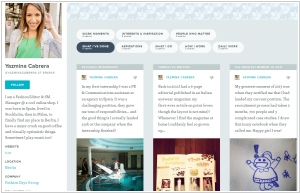
You're probably familiar with Pinterest, the website that displays numerous pictures in rows, but it remains a mystery as to why it has gained such immense popularity and why its "a-lot-of-pictures-in-several-rows" format has become so widely adopted. Recently, we highlighted how the new sections in Office 365 have adopted a similar layout. Now, take a look at the new business-oriented social network Somewhere, which has decided to challenge LinkedIn by leveraging this secret weapon. Conceptually, this network is not too different from LinkedIn. Users can create profiles and fill them with relevant information, including pictures, showcasing their work, accomplishments, and skills. It allows you to follow others and be followed by them, with the main objective being to establish business connections. However, we wouldn't be surprised if the "a-lot-of-pictures-in-several-rows" formula proves to be the differentiating factor that propels this network to potentially surpass LinkedIn as the go-to business platform.
2013. Yahoo acquired social email-plugin Xobni
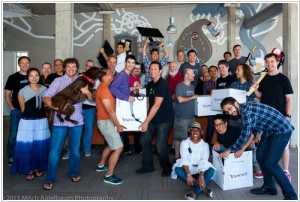
Xobni team celebrating with money-boxes from Yahoo. ***


